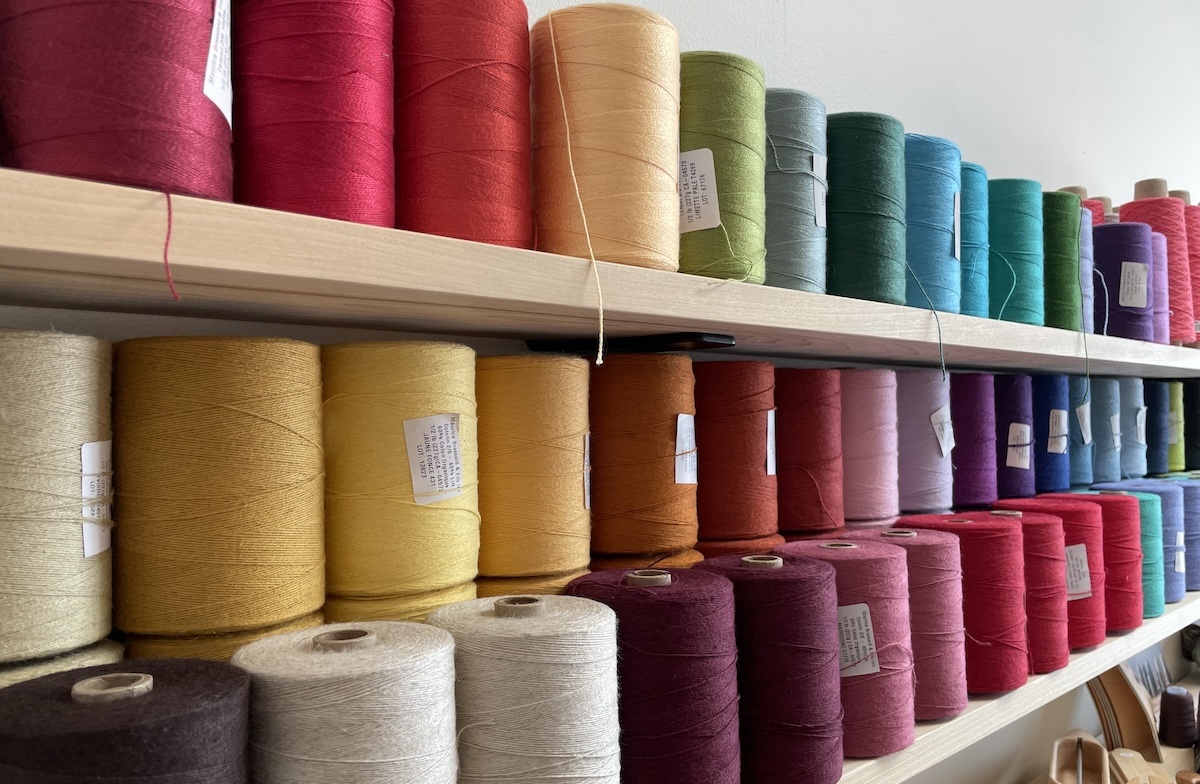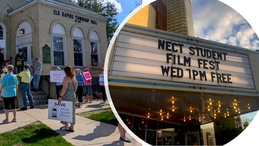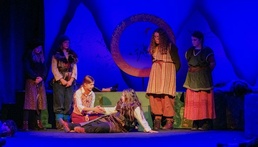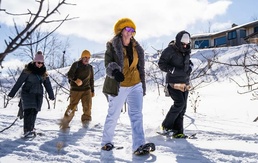
Crafting with a Conscience
Cozy up with the fiber arts scene of northern Michigan
By Geri Dietze | Nov. 15, 2025
Have you heard of slow textiles? The idea is to have just enough of something—useful, beautiful, or both, to keep and enjoy—that will not end up in a landfill. According to earthday.org, in the U.S. alone, an estimated 11.3 million tons of textile waste, about 85 percent of all textiles, go to landfills annually.
Enter the mindful sewing and knitting circle, and the peace that comes from spending time in low-velocity, hands-on pursuits, with like-minded folk.
The Bird Nest
In 2023, Alisha Miller was a seamstress who needed to find a place other than her home to work and meet clients, never dreaming that she would eventually end up with not one, but two, vintage storefronts in downtown Cadillac. Her rented workspace soon became The Bird House, a retail spot filled with goods from area crafters, followed by The Bird Nest, her specialty fabric and yarn shop.
The very existence of these two retailers illustrates the growing success of the slow textile movement, in which using quality products for crafting and knitting helps the environment, the local economy, and the conscience. Currently, tariffs are “pretty steep,” Miller admits, “but the store absorbs that.”
The Bird Nest doesn’t try to compete with the big box craft store down the road, instead offering an inventory of small batch, high-end yarns, and a vivid collection of quality designer fabrics. Miller’s customer base is made up of serious knitters and crafters, those who know what they want.
“The market was larger than I expected,” Miller says, and the busy shops are proof. (Hobby yarns and starter sets are available, too.) Much of the yarn is sold in hanks, (a loose twist, good for storing) and cannot be used without first winding it, lest it become “a tangled mess,” so Miller winds the yarn at no cost.
The Bird Nest carries around 20 lines of yarn, mostly small batch, hand-dyed, breed-specific fibers, sourced from the United States and Europe. (Those with allergies will find a selection of cotton, linen, and acrylics.) Find alpaca yarn from Blue Sky Fibers and 100 percent Uruguayan merino from Malibrigo; Amano of Peru is the source of fine wools and alpacas, plus a stunning, hand-painted, premium line called Yana Journeys; Baah Yarn’s Mammoth line is produced in Las Vegas, Nevada; and a Yooper brand called Keenan is hand-dyed wool crafted in Rudyard.
The Bird Nest also stocks a large collection of high-end designer cottons, mainly for crafting, including Tilda of Norway, vintage patterns in colors both soft and bright; the eponymous Charlie Harper nature designs from the minimalist realist; Heather Ross nostalgic prints in clear, crisp shades; and Tula Pink, which must be seen to be believed, with giant wallpaper florals, quirky animals, and optical illusions in saturated colors.
Next door, The Bird House has about 50 vendors offering handmade goods, including clothing, quilts, bags, jewelry, woodcraft, coffees and teas, honey and sauces, and skin care products, plus more. Vendors volunteer their time once a month, pay rent for their space, and keep 100 percent of their earnings.
Check out the popular social events at the store, including Wind It Up Thursdays for open knit and crochet, and Open Stitch, the first Saturday of every month. (Think open swim, but dry, with yarn.)
Visit thebirdnestcadillac.com or 111 N. Mitchell St. STE B., Cadillac.
Fibershed Yarn and Fiber Arts
The term fibershed refers to a geographic region and the farmers, fiber producers, processors, and consumers within it, and that is precisely what goes on at Boyne City’s Fibershed.
Owner Nadine Basile calls it “primarily a retail yarn and craft supply shop,” and it’s true, but there’s so much more, and the space is far different than the big box craft retailers. Fibershed sells the must-haves, from needles and hooks, to the tools, fibers, and natural dyes for spinning, weaving, and felting, plus looms and spinning wheels, and everything in between, including fun stuff for non-knitters.
But it is the gorgeous yarns—in incredible colors, weights, and hands (the tactile feel)—that can make a crafter swoon. Fibershed sources mostly from a community of producers close by and around the state: the farmers and their flocks, the artisans and their natural plant-based dyes, and the mills where breed-specific fibers are spun into magic. Why Not Fibers, Traverse City; Coyote Run Fiberwork, Holly; Brittany Rae Knits, Petoskey; Supernova Dye Works, Lansing; and North Bay Farmer, Pinconning, are just some.
Basile also stocks yarn she makes herself from the sheep on her Boyne Falls farm. She became interested in fiber after grazing sheep in West Coast vineyards for eco-friendly weed and soil management, and she needed something to do with all that fleece.
“My intent is to make Fibershed a Michigan-specific shop for hand crafters,” Basile explains, adding that she is getting closer to realizing her goal as her connections in the fiber community grow.
Basile puts a “heavy emphasis” on education, art, and community through classes and group events, and the store can resemble “a very, very small version of a local fiber festival.”
“I’m constantly thrilled and surprised by the kinds of talent that walk through the door and ask if they can sell their artwork here, or with an idea for a class they might want to teach,” she says.
Currently, Fibershed has consignments from a couple dozen fiber artists and about a dozen teachers. Beginners can learn all fiber skills, from knitting to spinning, mending to weaving, and more, and advanced classes keep interest high. (And everyone is welcome. One farmer had to bring in two lambs, still on the bottle, so as not to miss class.)
Most recently, the shop hosted an off-site eco-printing and natural dye retreat called How to Dye in the Woods. “It was a hit,” Basile says.
Despite Basile’s dedication to local sourcing, she must still deal with tariffs. She currently sources some silks, cottons, linens, and cashmere from larger commercial ventures to meet demands, thanks to our less than robust textile industry in the U.S. And even if some crafting tools are produced in the U.S, the components still come from overseas, so it’s hard to avoid.
“As a country, we have lost the connection between soil, animals, wool, craft, and community, though to me, that line is as straight as a warp string,” she admits.
Still Basile carries on, “to build community, [to] learn…, educate, and gather people together, and to…show off a little of the authentic skill and talent that makes Michigan so special. I believe that people are genuinely craving this kind of real connection. Plus, we needed access to good supplies up here. The winters are long.”
Fibershed is moving soon to larger digs, so keep an eye on the website for the new schedule of classes and events, including the grand re-opening.
Visit michiganfibershed.com or 211 Front St., Boyne City. (New address, formerly Lashes and Lace Salon.)
Trending

A Tale of Two Historic Buildings in Elk Rapids
For one iconic building in Elk Rapids, a 2025 controversy has largely subsided. But for another it continues, as ownership t… Read More >>
There and Back Again at Old Town Playhouse
We’re going on an adventure! And there will be trolls, goblins, and giant spiders! But also good friends and better ta… Read More >>
Slushy Outdoor Fun
Ready to get a little sloshy—we mean slushy? Local wineries and winter-weather hotspots are leaning into the season wi… Read More >>


